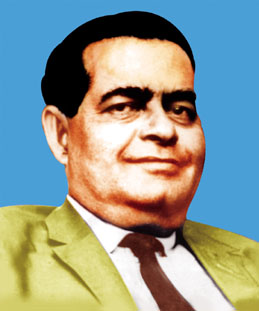Related Research Articles

The Language Movement Day, officially called Language Martyrs' Day, is a national holiday of Bangladesh taking place on 21 February each year and commemorating the Bengali language movement and its martyrs. On this day, people visit Shaheed Minar to pay homage to the movement's martyrs and arrange seminars discussing and promoting Bengali as the state language of Bangladesh.

Huseyn Shaheed Suhrawardy was a Pakistani Bengali barrister and politician. In Bangladesh, Suhrawardy is remembered as a pioneer of Bengali civil rights movements, later turned into Bangladesh independence movement, and the mentor of Bangladesh's founding leader Sheikh Mujibur Rahman. He is also remembered for his performance as the Minister for Civil Supply during the Bengal famine of 1943. In India, he is seen as a controversial figure; directly responsible for the 1946 Calcutta Killings, for which he is often referred as the "Butcher of Bengal" in West Bengal.

The Bengali language movement was a political movement in East Bengal in 1952, advocating the recognition of the Bengali language as a co-lingua franca of the then-Dominion of Pakistan to allow its use in government affairs, the continuation of its use as a medium of education, its use in media, currency and stamps, and to maintain its writing in the Bengali alphabet / Bengali script
Shah Azizur Rahman was a Bangladeshi politician who served as the prime minister of Bangladesh. However, he was the subject of considerable controversy for his collaboration with the Pakistan Army against the struggle for the independence of Bangladesh.

Suhrawardy Udyan is a national memorial and public space located in Dhaka, Bangladesh. Originally known as Ramna Race Course, it holds significant historical importance due to its association with key events in the country's history.
Events from the year 1960 in Pakistan.
Abul Hashim was a Bangladeshi politician and Islamic thinker in the Indian Subcontinent.

Fazlul Quader Chowdhury was a Bengali politician who served as the 5th speaker of the National Assembly of Pakistan from East Pakistan. He belonged to Ayub Khan's Convention Muslim League. He was also the acting president of Pakistan from time to time when Ayub Khan left the country. His elder brother Fazlul Kabir Chowdhury was the leader of the opposition in East Pakistan assembly. Quader was preceded by Maulvi Tamizuddin Khan of Awami League.

Tofazzal Hossain, popularly known as Manik Miah, was a Pakistani Bengali journalist and politician. He served as the founding editor of The Daily Ittefaq. He wrote the editorial Rajnoitik Moncho. Most of his newspaper's journalists were considered leftist, as Miah followed the pattern of Awami League. According to journalist and editor of Shongbad Bozlur Rahman, Awami activists followed his editorial more than any actual decision of a meeting. He was a close associate of the founder of Bangladesh, Sheikh Mujibur Rahman.

Shaheed Suhrawardy Medical College (ShSMC) is a public medical college and hospital located in Dhaka, the capital city of Bangladesh. It was named after Huseyn Shaheed Suhrawardy.

Ubaidullah Al Ubaidi Suhrawardy was a Bengali Islamic scholar, educationist and writer from Midnapore. He is often regarded as the Father of modern Islamic education in Bengal.

The 1969 East Pakistan uprising was a democratic political uprising in East Pakistan. It was led by the students backed by various political parties such as the Awami League, National Awami Party, and Communist party of East Pakistan and their student wings, and the cultural fronts against Muhammad Ayub Khan, the president of Pakistan in protest of the oppressive military rule, political repressions, Agartala Conspiracy Case and the incarceration of Bangabandhu Sheikh Mujibur Rahman and other Bengali nationalists.

Amanullah Mohammad Asaduzzaman was an East Pakistani student activist whose death at the hands of police during a protest on 20 January 1969 "changed the nature of the student-mass movement and ... turned into a mass-upsurge against the Ayub regime and its repressive measures", according to Banglapedia. The Daily Star reports him as one of three martyrs of the 1969 uprising in East Pakistan which "set the stage for the liberation war". He was awarded the Independence Day Award in 2018 posthumously by the Government of Bangladesh.

Abdul Hamid Khan Bhashani, often shortened as Maulana Bhashani, was a Bengali politician. His political tenure spanned the British colonial India, Pakistan and Bangladesh periods. Maulana Bhashani was popularly known by the honorary title Mozlum Jananeta for his lifelong stance advocating for the poor. He gained nationwide mass popularity among the peasants and helped to build the East Pakistan Peasant Association. Owing to his political leaning to the left, often dubbed Islamic Socialism, he was also called 'The Red Maulana'. He is considered as one of the main pillars of Bangladeshi independence (1971).

Muhammed Ishfakul Majid was the first East Pakistani general in the Pakistan Army.

The All-Pakistan Awami League was a Pakistani political party founded by Huseyn Shaheed Suhrawardy in February 1950. Pir of Manki Sharif and Khan Ghulam Mohammad Khan from the North-West Frontier Province (NWFP) joined it soon afterwards.

Abu Hussain Sarkar was a Pakistani Bengali politician and lawyer. He served as the fourth chief minister of East Pakistan. Under his ministry, the Bangla Academy was inaugurated and 21 February was recognised as Shohid Dibosh in memory of the Bengali Language Movement.

Noor-e-Alam Siddique was a Bangladeshi politician and businessman. He was particularly known for his involvement in the Bangladesh Liberation War and pre-independence era politics as a student leader. He served as a Member of Parliament for Jessore-2 in the first parliament, from 1973 to 1975.
Golam Moula was a Pakistani-Bengali medical doctor, politician and political organizer. He was elected a member of the East Pakistan Legislative Assembly in the by-elections of 1956 and a member of the National Assembly of Pakistan in 1962. At that time he was the whip of the opposition in the Pakistan National Assembly.
Alamgir Siddique was a politician from Jashore, Bangladesh, who is well-known for his involvement in the Bengali language movement which advocated the recognition of Bengali as a state language of Pakistan.
References
- 1 2 Sirajul Islam; Miah, Sajahan; Khanam, Mahfuza; Ahmed, Sabbir, eds. (2012). "Education Commission". Banglapedia: the National Encyclopedia of Bangladesh (Online ed.). Dhaka, Bangladesh: Banglapedia Trust, Asiatic Society of Bangladesh. ISBN 984-32-0576-6. OCLC 52727562. OL 30677644M . Retrieved 14 December 2024.
- 1 2 "Education Movement 1962: unresolved question of inequality in education". New Age (Bangladesh) . Retrieved 26 March 2023.
- ↑ "Education Day with New Message". Daily Sun. Retrieved 26 March 2023.
- 1 2 3 4 Ahmed, Quazi Faruque (16 September 2009). "Evaluating the 1962 education movement". The Daily Star. Retrieved 26 March 2023.
- 1 2 3 4 ১৯৬২ সালের ১৭ সেপ্টেম্বরঃ শিক্ষা আন্দোলন. Archived from the original on 19 September 2011. Retrieved 22 February 2011.
- 1 2 ৬২’র শিক্ষা আন্দোলন. 9 December 2010. Archived from the original on 25 July 2011. Retrieved 22 February 2011.
- ↑ আজ মহান শিক্ষা দিবস. Prothom Alo . 17 September 2010. Retrieved 22 February 2011.
- ↑ "Remembering the education movement of 1962". The Independent (Bangladesh) . Retrieved 26 March 2023.
- ↑ "Education Day 2018 and students' movement". The Financial Express (Bangladesh) . Retrieved 26 March 2023.
- ↑ "Education Day: Vow to manage crises in education". The Financial Express (Bangladesh) . Retrieved 26 March 2023.